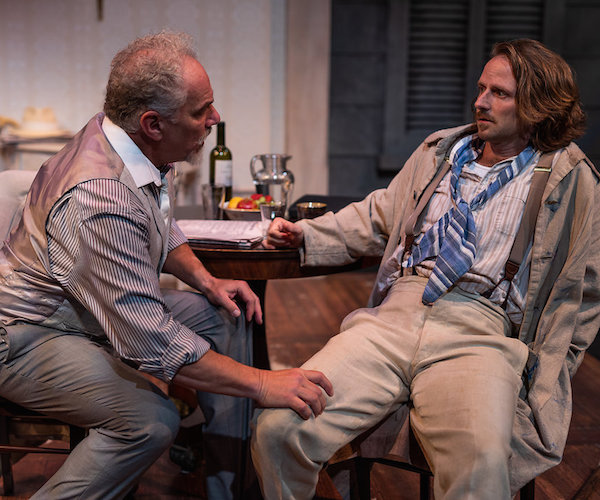Theater Review: “Creditors” — A Memorable Staging of a Classic
August Strindberg’s Creditors turns out to be a play that speaks chillingly to our time.
Creditors by August Strindberg, adaptation by David Greig. Directed by Nicole Ricciardi. Staged by Shakespeare & Company in the Elayne P. Bernstein Theatre, Lenox, MA, through August 12.

Ryan Winkles (r) and Jonathan Epstein (l) in Shakespeare & Company’s production of “Creditors.” Photo: Nile Scott Studio.
By Helen Epstein
Rarely have I seen a theater audience as engaged as by Shakespeare & Company’s new production of August Strindberg’s Creditors. They gasped, they laughed, and they hissed at what may be among the weightiest and most intense performances I’ve seen in 40 years of attendance at Shakespeare & Company.
August Strindberg’s brutal tragicomedy about marriage, revenge, and taking stock of who owes what to whom in relationships is not for every theatergoer. Neither is Strindberg’s misogyny — even when mediated by a gifted woman director such as Nicole Ricciardi. But even if you hate Strindberg, you would be missing something extraordinary by not seeing this production of a classic psychological drama.
Written in 1888 (right after Miss Julie, another masterpiece), Creditors is a play that has invited generations of interpreters and audiences into the immediacy of Strindberg’s vision of intimate relationships, enticing them to discover new facets in its subject matter and characters: the vengeful, manipulative older man and high school teacher Gustav; the child-like artist Adolf; and Tekla, the joyous, independent woman and author they both married.
Ricciardi’s powerful production in Shakespeare & Company’s small Bernstein Theater gives us three complex characters thrashing out interpersonal conflicts that are still alive and well in couples therapy today: idealization versus realistic appraisal of the other; conflicts between fusion and separateness, trust and betrayal. Though a strong undertone throughout the play, Strindberg’s fabled misogyny pales besides the script’s persistent exploration of each character’s ambitions and disappointments, their strengths and vulnerabilities.
The set is the lounge of a seaside resort in Sweden, suitably designed by John McDermott and with period costumes by Deborah Brothers. The tense 90-minute drama is enacted in three long scenes: the first, between the two men; the second, between Tekla and Adolf; the third between Gustav and Tekla. It is one of the achievements of this production that, from beginning to end, the three actors seemed bound to one another by invisible threads.
Adolf, as portrayed by a winsome and wispy Ryan Winkles, is the youngest of the trio. He is tasked with portraying the simplest and weakest of the three figures: credulous and head-over-heels in love with his older, strong-minded wife, he is easy prey for the predatory Gustav.
During a week at this seaside resort while Tekla has been absent, Gustav has become the younger man’s mentor and confidante. He has even talked him into abandoning painting for sculpture. Over the course of their conversations, like an incarnation of evil, Gustav has gaslighted and bullied Adolf into doubting himself as an artist and a man. It is a testament to Winkles’ sympathetic treatment of his character that we resist dismissing him as a fool. Instead, no doubt aided by our recently acquired and detailed knowledge of predatory priests, sports coaches, and manipulative authority figures of all kinds, we recognize him as an immature and unwitting male victim.
Kristin Wold’s Tekla, Gustav’s ex-wife and his object of revenge, is not as charismatic or playful or passionate as she is often portrayed. Younger than Gustav and older than Adolf, she serves in this production as a subdued, rather pragmatic contrast to the histrionics of the males — not the sexual force that has dominated both of their lives. Wold’s Tekla comes off as businesslike, almost priggish, as she pursues her own interests. I often wished the actress would have opened up and given us a more seductive and flamboyant character.
The most brilliant performance in this production belongs to Jonathan Epstein (no relation to me), who inhabits the role of the betrayed and enraged husband Gustav with an intensity I have never seen before in this veteran Shakespeare & Company actor. His stage presence is overpowering, particularly his exploitation of his vocal range, which is enormous. He moves with ease from the softest, most cajoling aside to the most abusive expression of fury. For some theatergoers, Epstein will call up Iago; for me, he seemed far more powerful — a Satan Incarnate. Coldly strategic, bent on revenge without mercy, he is far more than a misogynist — he is a force of nature.
In David Greig’s deft and respectful adaptation, which condenses Strindberg’s long sentences and updates his language (without adding jarring 21st century idioms), Creditors turns out to be a play that speaks chillingly to our time. Ricciardi’s production is a rare theatrical experience — it leaves you stunned. You will be thinking about this show long after the final curtain call.
Helen Epstein in the author of Joe Papp: An American Life and other books about the arts, available at Plunkett Lake Press. She has been reviewing for the Arts Fuse since its inception.
Tagged: August Strindberg, Creditors, Culture Vulture, Jonathan Epstein
